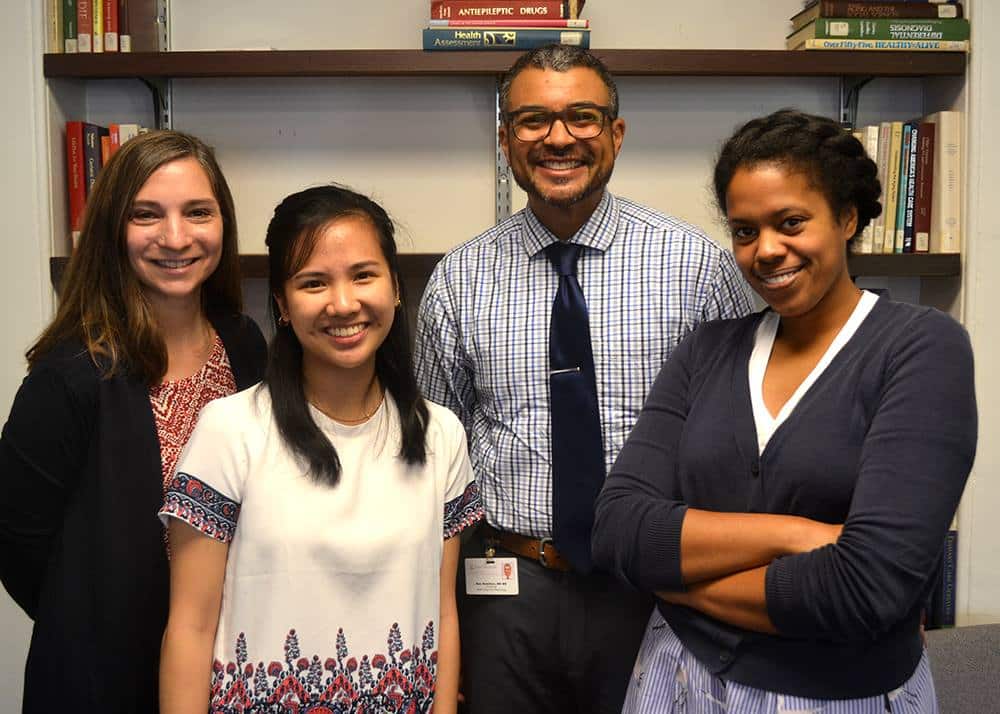
Mentors Dr. Dawn Mechanic-Hamilton (left) and Dr. Roy Hamilton (back center) pose with Maria Florence Aquina Nabong (front left) and Catherine Norise.
By Joyce Lee
Medical students Catherine Norise and Maria Florence Aquino Nabong recently celebrated completion of the new Penn Minority Scholars in Aging Research program.
Norise and Nabong, the program’s first two scholars, contributed to research on neurodegenerative diseases under the guidance of faculty mentors Roy Hamilton, assistant professor of neurology and co-director of the laboratory for cognition and neural stimulation, and Dawn Mechanic-Hamilton, assistant professor of neurology and director of cognitive fitness programs and neuropsychological services at PMC.
Norise, from the Perelman School of Medicine, worked with Dr. Hamilton on a project that examined the use of biomarkers in distinguishing primary progressive aphasias (PPAs). PPAs are characterized by slow, progressive impairment of language capabilities, often associated with Alzheimer’s disease and other neurodegenerative diseases.
“I am so grateful to [the program] for giving me the opportunity to meet such brilliant physicians and researchers, as well as to learn about the nuances of MCI and progression of neurodegenerative diseases in the aging population,” Norise said. “I also found it quite meaningful to see how these diseases were approached from both the diagnostic and research perspective.
Norise said she will apply what she learned to her upcoming residency in neurology.
“It is a pleasure and a privilege to serve as a long-time mentor for Catherine Norise,” said Dr. Hamilton. “Over the years, I have developed a deep appreciation for Catherine’s intellect, industriousness, resilience, and maturity, all of which were on display this summer as she conducted her research. Supporting Catherine this summer has been a great way for [PMC] to invest in the promising future of an outstanding young woman, and surefire way for the center to get its Minority Aging Scholars program off to the right start.”
Nabong, from the Lewis Katz School of Medicine at Temple University, worked with Dr. Mechanic-Hamilton on a project that examined the use of transcranial direct current stimulation (tDCS) in cognitive training in healthy older adults. tDCS is a non-invasive method of neural stimulation that is delivered via electrodes to the scalp and has been a focus of research for its potential in improving cognitive performance.
“I had a truly enjoyable experience working at PMC this past summer,” Nabong said. “It was awesome to share what I learned about the methods of a meta-analysis as well as general research skills I hope to integrate as a medical student and future doctor.
Dr. Mechanic-Hamilton said she has “no doubt” that Nabong will have a promising medical career.
“Florence brought great enthusiasm, industriousness and love of learning to her summer project,” she said. “She made great use of her experience with the multidisciplinary PMC team to expand her understanding of the intersection of clinical treatment and research in neurodegenerative disease.”
The Penn Minority Scholars in Aging Research program provides 12-week research internship opportunities to medical and doctoral students who are underrepresented in the field of aging research. Given the disproportionate impact Alzheimer’s disease and dementia has on minority populations, this program was created in 2017 to work towards increasing the diversity of clinicians and researchers in the field.
The program is co-led by PMC co-director Dr. Jason Karlawish and Dr. Hamilton. For more information about the Penn Minority Scholars program, please visit the Academic Opportunities page.